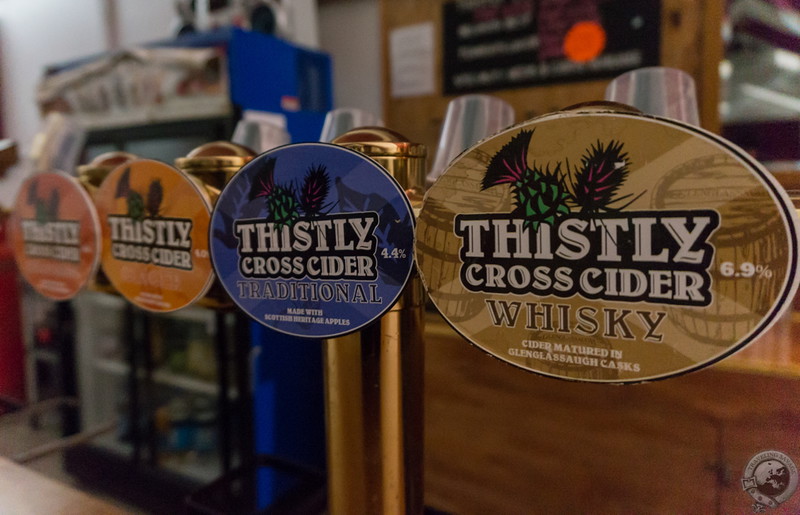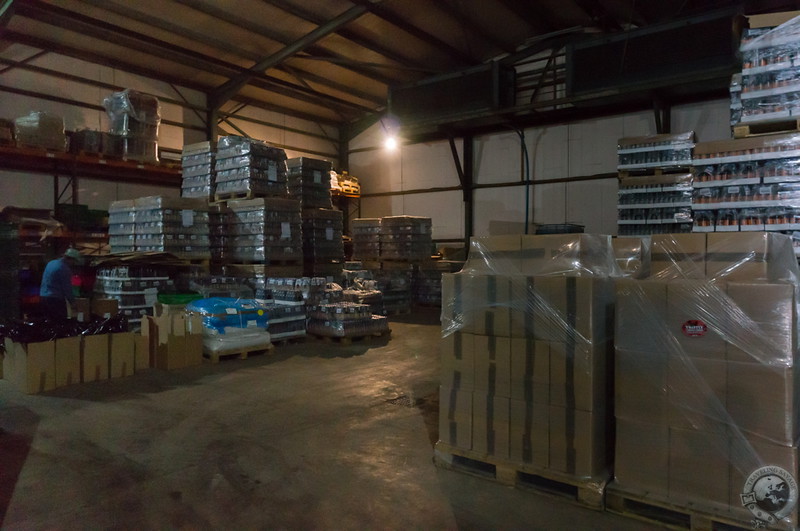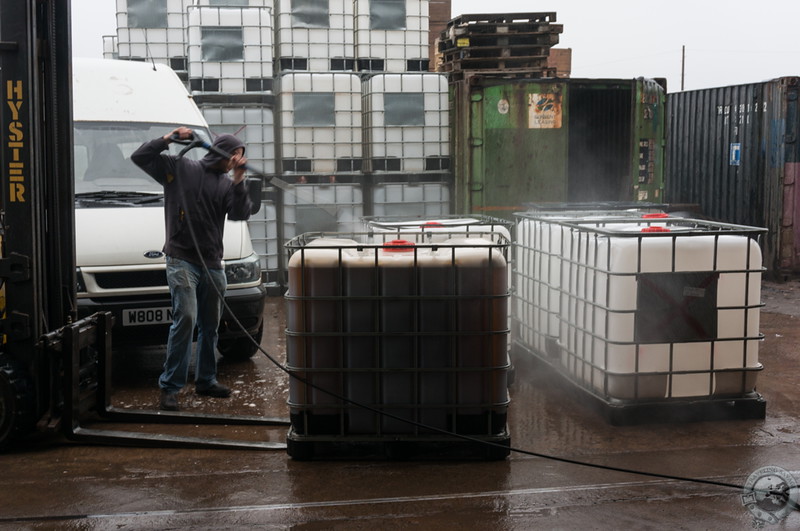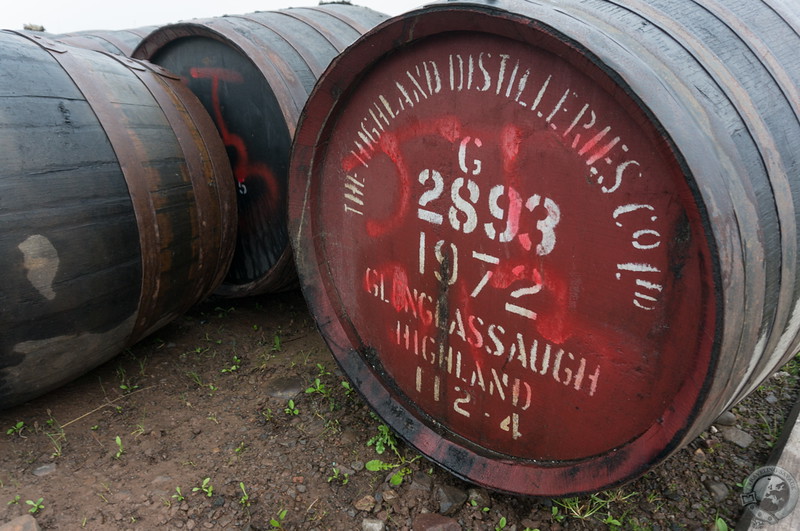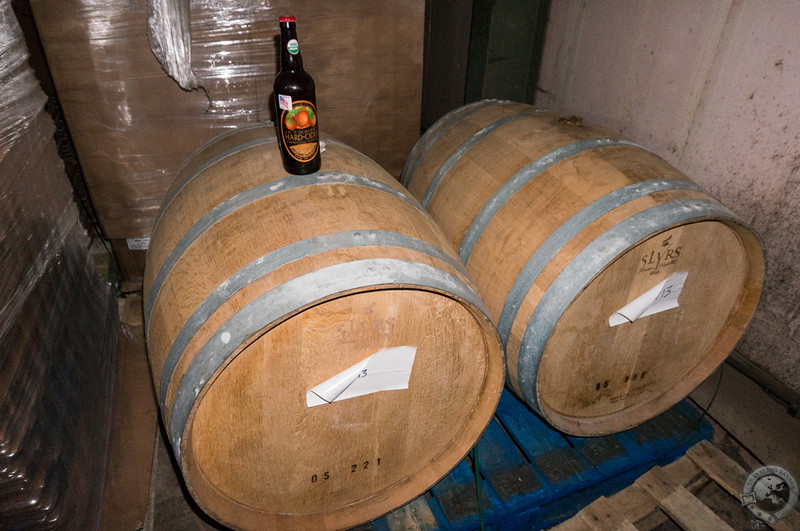In recent years I’ve become a hobbyist cidermaker back home in Wisconsin. It’s not too fancy. I purchase fresh apple juice from local orchards, pitch it into a big glass carboy with some yeast, and let the magic of fermentation take over. I may not truly understand what I’m doing, but the end product usually tastes pretty good.
Part of my pre-trip planning process involves seeking out producers of Scottish beverages. I’ve been to countless distilleries and a handful of breweries in my travels around Scotland, but never a ciderworks. When I learned that Thistly Cross Cider was headquartered in East Lothian, I knew that would change.
I drove through a maze of old farm roads traversing the back country of East Lothian as cool April rain fell upon the fields. I never use GPS when I travel, but I think the people in Scotland’s hinterlands rely more on folk wisdom than maps to get around. On this day I was fresh out of folk wisdom, and yet I managed to drag my mud-spattered car to my destination, a cluster of houses and warehouses just south of Dunbar and the A1.
I had come to Thistly Cross Cider.
Cider is a big deal across the British Isles. It’s just starting to catch on again in the States after a 200-year absence, but it has always been popular across the pond. Mega-producers like Magners, Strongbow, and Kopparberg can be found in every pub and grocery store, but those brands are Irish, English, and Swedish, respectively. And far too sweet for my tastes.
Thankfully, there are loads of independent cidermakers doing innovative and counter-mass market work, and Thistly Cross is perhaps the best known among Scotland’s field.
Dunbar, on East Lothian’s coast, is counted among Scotland’s sunniest places. On that day you could have fooled me. The cool rain reminded me of autumn, which seemed appropriate given that I was about to explore the production facility of Thistly Cross Cider. Thistly Cross is masterminded by two men – Ian Rennie, a local farmer and businessman, and Peter Stuart, the artistic cidermaker. The dream collaboration began when Peter started buying apples from Ian, and, delirious with the quality of the cider, they cast themselves down the path of starting a traditional ciderworks.
Ian greeted me upon my arrival, and we quickly jumped in his car to do a little tour of his local fields and businesses, including strawberry tunnels (for use in their strawberry cider), function hall, and smoked salmon store, while we waited for Peter to return to Thistly Cross HQ. He’s a tall, likable guy with an easy manner. Ian’s family owns much of the farm land around Dunbar, and it’s put to good use not least by its involvement in Thistly Cross’s cider.
Back at the ranch Peter had returned from his errands. He’s soft-spoken, intensely perceptive, and passionate about his growing cider empire. We cross the puddle-strewn pavement to the warehouse where hands spray down great fermentation tubs holding hundreds of gallons of cider. From Thistly Cross’s humble beginnings it has grown across Scotland and the world – I can even find it at my local grocery store in Madison! Peter is quick to point out that cider-lovers were thirsty for something different than the mainstream sticky-sweet ciders. He wanted to take Thistly Cross back to a more traditional style.
In the dark warehouse, Peter blithely collected a variety of Thistly Cross’s offerings from various pallets and cracked them open. At the time of my visit, Thistly Cross offered seven varieties of cider: Traditional, Original, Original Still, Strawberry, Ginger, Elderflower, and Whisky Cask. Except for the still version, all of the ciders have a light carbonation akin more to Vinho Verde than beer. The Traditional and Whisky Cask varieties are my favorite. They have real apple flavor as opposed to the saccharine imitation you find in mass-market cider, and there’s even some tannin that provides a nice bitter counterpoint.
Ian and Peter take their casks seriously. Most of the cider spends six months aging in barrels – not fermenting – and even in my limited experience making cider I’ve found that allowing cider to sit after fermentation brings out more of the subtle flavors. As you can see, they’ve even got a raft of whisky casks from Glenglassaugh distillery on the Moray coast. Whisky and cider are a surprisingly good marriage.
The growing popularity of Thistly Cross Cider has made it difficult to keep up with demand, and while this is a good problem to have it is still a problem. Apples are in such short supply that Thistly Cross will trade you their delicious beverages for any apples you bring in. Sounds like a deal to me.
The Thistly Cross operation outside Dunbar has a small-time feel but their production is anything but that, and I imagine that they will be moving up to bigger and better facilities in the next few years. After a nice chat in their office kitchen with some tea I bid them farewell. They sent me off with a mixed six pack of their tasty ciders, which I enjoyed on the rest of my trip through Stirling and Fife.
Cider is an interesting beast. It falls somewhere between beer and wine, and I’ve found in the last couple of years that sometimes it’s exactly what I want to drink. Not too heavy, not too light, not too bitter, not too sweet. Next time you’re out at the store or the pub, give Thistly Cross a try. It’s nice to support the independent craftspeople, especially when their product is this good.

